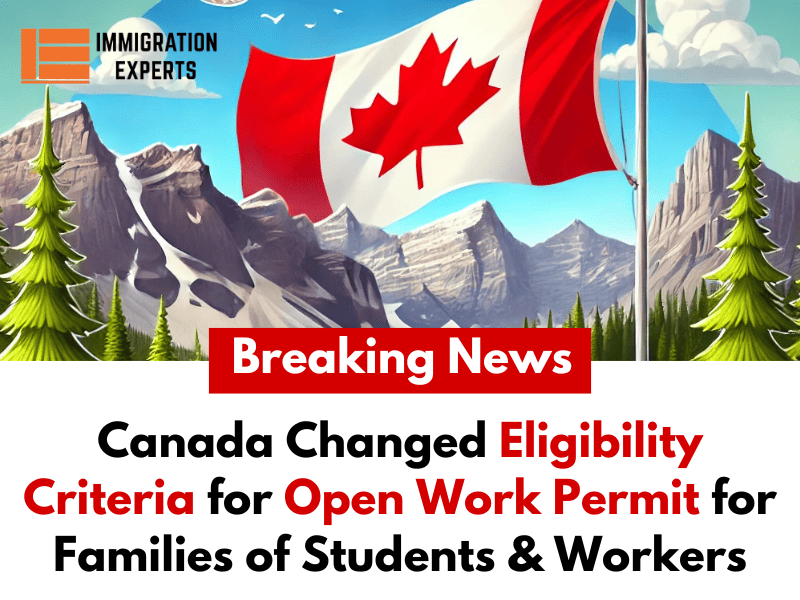051 8439995, 042 35911332

The eligibility requirements for Open Work Permits (OWPs) for family members of foreign workers and international students have undergone significant revisions, according to Immigration, Refugees, and Citizenship Canada (IRCC).
With effect from January 21, 2025, these modifications seek to improve the effectiveness of temporary resident programs while bringing them into line with Canada’s economic objectives and the labor market demands.
Things You Will Find In This Page
Changes to Spousal Open Work Permit Eligibility in Canada
For Spouses of International Students:
- Master’s Programs: Only spouses whose partner is enrolled in a master’s program that lasts at least 16 months are eligible to apply for an OWP.
- Doctoral Programs: OWPs are available to spouses of students pursuing PhD degrees.
- Professional Programs: There will also be some professional programs, but more information about these will be made public as the implementation date, January 21, 2025, approaches.
For Spouses of Foreign Workers:
- High-Skilled Jobs: If a spouse’s partner holds a position that falls under TEER 0 or 1 of the Canadian National Occupational Classification (NOC), the spouse may apply for an OWP.
- Jobs in Demand: Spouses of employees in TEER 2 or 3 positions may apply if those positions are in industries with a labor shortage or if they fit with government priorities.
- The natural and applied sciences, building, healthcare, education, sports, the military, and natural resources are some of these industries.
- Work Permit Duration: When the spouse applies for an OWP, the foreign worker must still have at least 16 months left on their work permit.

No More Open Work Permits for Dependent Children
One significant modification is that the revised policy will no longer allow dependent children to receive family OWPs. Spouses will now be the only priority.
Shifting to the New Eligibility Criteria
Families with OWPs under the existing regulations won’t be affected right away. Until their permissions expire, they will continue to be valid. But for renewals, there will be more stringent guidelines:
- Meeting Eligibility Requirements: Family members must meet the updated criteria to renew their permits.
- Matching Duration: The renewal period must match the validity of the principal applicant’s work or study permit.
Who is Exempt from the New Rules?
Certain groups will not be affected by these changes and will continue to qualify for Open Work Permits (OWPs):
- Free-Trade Agreements: Notwithstanding the new limitations, spouses of employees covered by free-trade agreements will continue to be eligible for OWPs.
- Pathway to Permanent Residency: The family OWP eligibility of those moving to permanent residence will remain unchanged.
Other Work Permit Options for Ineligible Applicants
Immigration, Refugees and Citizenship Canada (IRCC) has made it clear that family members who are no longer eligible under the new regulations may still apply for other types of work permits. They must, however, fulfill the prerequisites for those particular permits under Canada’s more general immigration policies.

Public Opinion and Political Responses
The announcement has led to strong reactions from various groups:
- International Students: Many are concerned that these limitations may deter potential students from selecting Canada. Financial troubles or family separation may result from spouses’ incapacity to work.
- Employers: There are conflicting emotions among companies that depend on foreign talent. They worry that these changes may have an impact on employee retention and happiness, even if they support targeted immigration for vital job roles.
- Immigration Advocates: Critics contend that these regulations overlook the significance of maintaining family unity. They need a more well-rounded strategy that takes into account both family unity and financial demands.
- Political Opinions: Officials defend the adjustments by arguing that they are required to keep immigration programs intact and manage population growth. Nonetheless, some contend that these limitations damage Canada’s standing as a welcoming immigration destination for families.
Economic Impact
Regarding the impact of these reforms on Canada’s economy, experts are split:
- Potential Benefits: According to some, concentrating on industries with high demand can enhance job matching, lower underemployment, and boost economic efficiency.
- Possible Drawbacks: Others are concerned that having fewer working family members may result in lower consumer spending, financial hardship, and more social support expenses.
Future Outlook
The long-term effects of these modifications will be extensively watched when they are implemented.
Will they deter foreign families and students from relocating to Canada, or will they produce a more specialized and skilled workforce?
The administration has pledged to conduct frequent evaluations and modifications in response to public input and actual outcomes.
One of the biggest changes to Canada’s immigration policy in recent years is represented by these policy revisions. They seek to strike a balance between sustainable immigration policy and economic interests. It is unclear, though, how the new regulations would affect Canada’s economy and its standing as an immigration-friendly country internationally as they develop.
